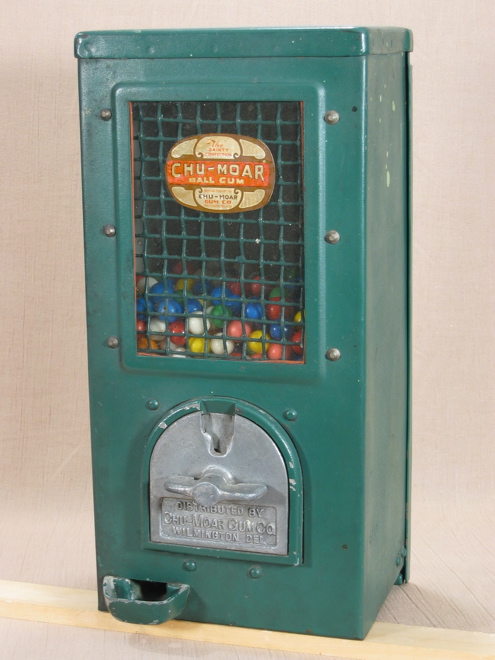___________________________________________________________________________________________
Chu-Moar / Universal Sales Machine

___________________________________________________________________________________________

Universal Sales Machines Co., Boston, MA, c. 1926, 16 1/4". The Chu-Mor is a private-labeled Universal; the only difference between this machine and a real Universal are the decal and the embossed identifier below the turn handle. I've always thought the Universal was a neat model, with a quasi-industrial appearance but nevertheless a good overall look. I think the screen inside the window sets it apart from some other, less secure models. Maybe the Universal was the preferred model for high crime areas.
Universals aren't rare, but they're not that common either, and this is the first one in 17 years of collecting that I can recall having had the chance to buy. A friend bought it on ebay from a seller who was not a collector. It was the only "Chu-Mor" my friend had ever seen, and it was in good condition. It didn't have the back door---which is what attaches to the wall if you mount the machine---but I've since learned that Universal back doors are as common as honest politicians. Good luck finding one. Shortly after selling this one, the same seller auctioned another one with graphics on the side panels, but overall that machine wasn't as nice as this one. As I write this, those are the only 2 Chu-Mors I know to exist, although many more Universal-stamped Universals are still around.
Some Universals were profit sharing machines, giving 1 gumball for one penny, 2 gumballs for the next, and 3 gumballs for the next penny, for a total of 6 balls for 3¢. Each penny buys you just one turn of the handle, but the holes in the vending wheel vary in depth and can accomodate 1, 2, or 3 stacked gumballs of the right size. Both Chu-Mors have this configuration. According to Silent Salesmen Too, Universals were also available in configurations of 1 gumball for 1¢ and 2 gumballs for 1¢. I don't know which of these 3 configurations is most common.
The example above is made of steel and has good heft, and (as mentioned) gives 6 balls for 3¢. It's 100% original except for the back door, which my-friend-the-previous-owner made, and the paint, which is an ancient repaint that's crazed and softened beautifully over the years. The steel back door he made is an amazing piece of craftsmanship, which I didn't appreciate until the first time I removed it after I bought the machine. I couldn't duplicate it if I had a year and all the tools I could scrounge at a Home Depot. He told me he's "kind of good at that kind of thing," and I had no idea how modest he was being when he told me.
According to Silent Salesmen Too, Remington Service Machines, a subsidiary of the Remington Arms Co., Inc., bought Universal in 1927.
Many thanks to Shawn Flock for passing along much of the information stated above.
___________________________________________________________________________________________
___________________________________________________________________________________________
©Small Vintage Vending 2003-2009